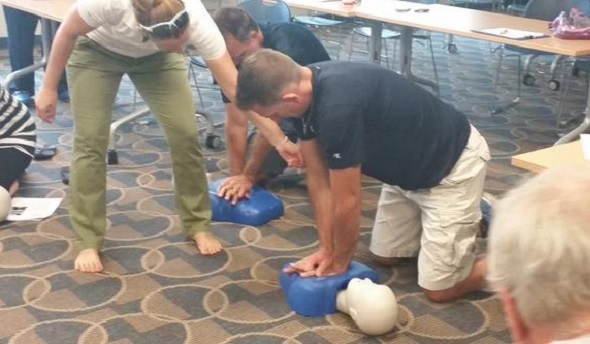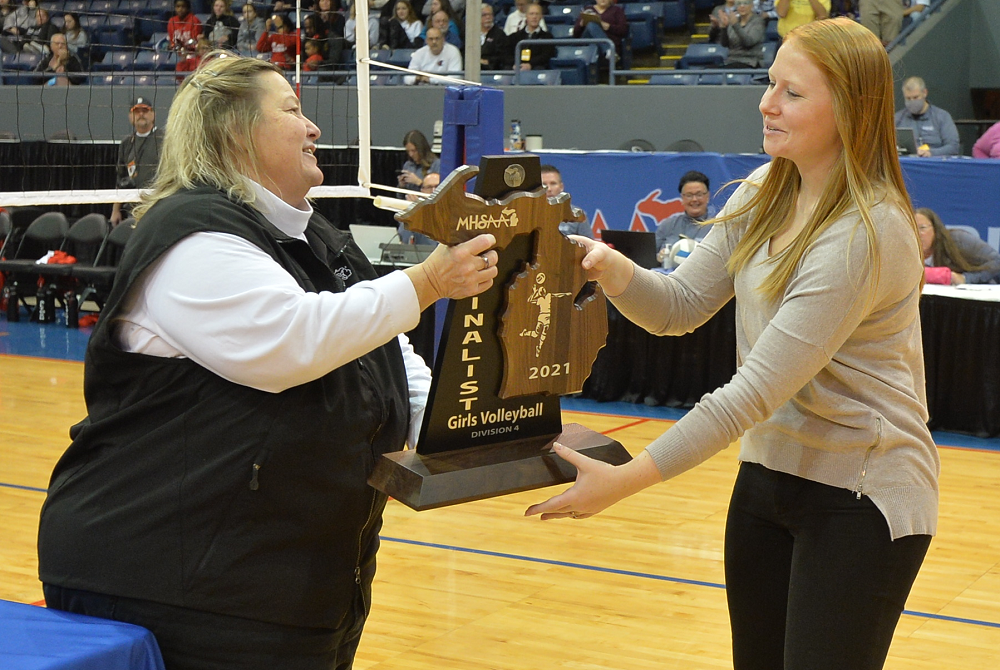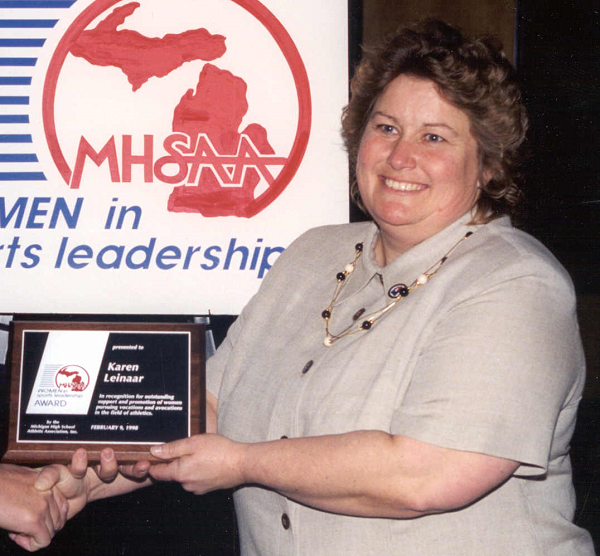
CPR Training, CAP Add to Preparedness
By
Geoff Kimmerly
MHSAA.com senior editor
October 12, 2015
A recent graduate from Ovid-Elsie High School named Chris Fowler started classes this fall at Michigan State University, his days representing the Marauders on the basketball court, football field and golf course now memories as he starts the next chapter of his young adult life.
But his story also will remain a reminder as his high school’s athletic department prepares each year to keep its athletes as safe as possible.
Three years ago next month, Fowler collapsed on the football practice field in cardiac arrest. The then-sophomore was brought back to life by two of his coaches, who revived him with CPR and an AED machine.
There’s no need for athletic director Soni Latz to recount the events of that day when explaining the importance of being ready to respond to a medical crisis – her coaches are well aware of why Fowler survived and understand completely why they too must be prepared.
“Everyone is very aware of what happened and the importance of being trained and knowing what to do, and actually feeling comfortable to step in and administer CPR when needed,” Latz said. “You can feel it’s never going to happen to you, but once it has, it makes you more aware and conscientious to be prepared.”
But Fowler’s story is worth noting on a larger level as varsity coaches at all MHSAA member schools are required this year for the first time to become certified in CPR, and as the largest classes in Coaches Advancement Program history begin course work that includes up to four modules designed to make them aware of health and safety situations that may arise at their schools as well.
The CPR requirement is the most recent addition to an MHSAA thrust toward raising expectations for coaches’ preparedness. The first action of this effort required all assistant and subvarsity coaches at the high school level to complete the same rules and risk minimization meeting requirement as high school varsity head coaches beginning with the 2014-15 school year.
The next action, following the CPR mandate, will require all persons hired as a high school varsity head coach for the first time at an MHSAA member school after July 31, 2016, to have completed the MHSAA’s Coaches Advancement Program Level 1 or Level 2.
In addition, MHSAA member schools this summer received the “Anyone can Save a Life” program, an emergency action plan curriculum designed by the Minnesota State High School League to help teams – guided by their coaches – create procedures for working together during medical emergencies.
“Coaches get asked to do a lot, and even if a school has an athletic trainer or some other health care professional, that person can’t be everywhere all the time. Coaches often are called upon to be prepared for (medical) situations,” said Gayle Thompson, an adjunct assistant professor at Albion College who formerly directed the athletic training program at Western Michigan University and continues to teach CAP sports medicine modules.
“The more (coaches) can learn to handle the situations that can inevitably arise, the better off they’re going to feel in those situations and the better care they’ll be able to offer their athletes. It’s proven that the faster athletes are able to get care, the quicker they’re able to come back to play.”
 Pontiac Notre Dame Prep – which has sent a number of coaches through the CAP program – began a focus on heart safety about five years ago after a student-athlete was diagnosed with a heart issue that allowed her to continue to play volleyball and softball, but not basketball. Athletic director Betty Wroubel said that prior to the student’s diagnosis, the school did provide training in CPR, AED use and artificial respiration; however, that situation put coaches and administrators further on the alert.
Pontiac Notre Dame Prep – which has sent a number of coaches through the CAP program – began a focus on heart safety about five years ago after a student-athlete was diagnosed with a heart issue that allowed her to continue to play volleyball and softball, but not basketball. Athletic director Betty Wroubel said that prior to the student’s diagnosis, the school did provide training in CPR, AED use and artificial respiration; however, that situation put coaches and administrators further on the alert.
Her school offers CPR training also to subvarsity and middle school coaches, using a combination of video instruction from the American Red Cross and in-person guidance by members of the school community who are certified to teach those skills. Students at the school also have received training – and it paid off a few years ago when one of them gave CPR to a baby who had stopped breathing at a local shopping mall.
Portage Central scheduled two sessions this fall for its coaches to receive not only CPR certification, but AED training as well. Central was fortunate to have an American Red Cross first-aid trainer in house, teacher Rachel Flachs, who also is close to the athletic side as the girls swimming and diving coach at Mattawan High School.
Central athletic director Joe Wallace said the training was offered not just to varsity head coaches, but every head coach on every level of the program so that “at least we know that at every given practice, every game, we’d have someone recently trained,” he said.
And he was proud of how his coaches immersed themselves in the subject matter.
“They were putting themselves in scenarios to see how it related to their own sports and asking really great questions,” Wallace said. “It was thought provoking.”
The CAP sports medicine modules are designed to do the same as coaches consider the medical situations they could face. They aren’t designed as “medical training,” said Tony Moreno, a professor of kinesiology at Eastern Michigan University and teacher of all four CAP sports medicine modules. Rather, attendees receive an awareness and basic education on common injuries, injury mechanisms and prevention, and how to create an action plan in the event of an injury incident.
The CAP program touches on a variety of safety topics in several of the available seven levels of coach education.
CAP 1 – which is part of the mandate for new coaches beginning next school year – includes “Sports Medicine and First Aid.” Cap 4 has modules titled “Understanding Athlete Development” and “Strength and Conditioning: Designing Your Program.” CAP 5 includes the session, “Peak Health and Performance.” Attendees also have the option of receiving CPR and AED training as an addition to some courses.
With a quick Internet search, coaches have no trouble finding a variety of resources on sports medicine, performance enhancement, nutrition and healthy living regarding young athletes. “However, some of these sources are more credible and scientifically-based in comparison to others,” Moreno said. “CAP strives on an annual basis to continue to update and improve the quality and credibility of this information and in a face-to-face manner where coaches have the opportunity to ask questions about their experiences and specific programs.”
“Having the CAP requirement will only make them better informed. Many have had this kind of information before, but there’s always something new coming,” Thompson added. “I think we do a good job, not of trying to tell them they were wrong, but maybe taking what they’ve known a step further and making them better prepared – empowering them to do their best.”
Wroubel may understand more than most athletic directors the growing list of tasks coaches are asked to accomplish; she’s also one of the winningest volleyball and softball coaches in MHSAA history and continues to guide both Fighting Irish programs.
But she and Wallace both said the CPR mandate isn’t considered another box to check on a to-do list; there’s enthusiasm because of its importance and the opportunity to carry those skills into other areas of community life as well.
Wroubel has served as a coach since 1975 and said this renewed emphasis on coaches having knowledge of sports medicine actually is a return to how things were when she started. Back then, coaches were responsible for being that first line of medical know-how, from taping ankles to providing ice and evaluating when their athletes should make a trip to the doctor’s office.
“When I first started coaching, we didn’t have sports medicine people, trainers, or team doctors other than for football. You did everything yourself,” Wroubel said. “I think everybody got away from that, but I think it’s coming back because a trainer can’t be everywhere.
“It’s healthy and it’s good for kids. … The more of us with emergency skills, the better we’re able to serve our community.”
PHOTOS: (Top) Portage Central coaches receive CPR training earlier this fall. (Middle) Pontiac Notre Dame Prep coaches practice during AED training. (Photos courtesy of school athletic departments.)

2023 Forsythe Award Celebrates Leinaar's 40 Years Dedicated to School Sports
By
Geoff Kimmerly
MHSAA.com senior editor
March 8, 2023
Few people in Michigan have had a longer-lasting influence on the rules and policies of educational athletics than Frankfort’s Karen Leinaar, who has served in several roles locally, statewide and nationally over more than 40 years contributing to the school sports community.
Thank you, Bill Baker.
The longtime teacher, coach, principal and superintendent during a career that stretched across multiple schools – including Leinaar’s growing up, Delton Kellogg – made an impression on the standout multi-sport athlete before she graduated from high school in 1977. Baker’s philosophy and work led Leinaar to study education at Michigan State University and then brought her back as Delton’s athletic director to begin four decades of making the same impact on children in her hometown and eventually in hometowns all over Michigan and beyond.
Baker died in 2009, but not before continuing to mentor Leinaar through many good times and tough ones.
“The man had two daughters that I grew up with, his wife was a teacher, and he demonstrated to all of us – he never missed an event – that we were important to him. That even though we weren’t his kids, we were his kids and athletics was a way to help kids become better people – and for some kids it was the only thing that they had positive in their life,” Leinaar said. “And he made it known just to that individual kid how important their participation was and their involvement, and how that helped them become the person that they were.
“That to me was such an example of how to help people be good people, that I just took that role on.”
It’s a role in which she continues to serve. Leinaar began her career as an athletic administrator in 1982, and as the interim athletic director currently at Frankfort High School is serving her fifth district in that position. Since June 2019, she also has served as executive director of the Michigan Interscholastic Athletic Administrators Association (MIAAA), the professional organization for school sports administrators in the state with a membership of nearly 700.
 To recognize that longtime and continuing impact, Leinaar has been named the 2023 honoree for the Michigan High School Athletic Association’s Charles E. Forsythe Award.
To recognize that longtime and continuing impact, Leinaar has been named the 2023 honoree for the Michigan High School Athletic Association’s Charles E. Forsythe Award.
The annual award is in its 46th year and named after former MHSAA Executive Director Charles E. Forsythe, the Association's first full-time and longest-serving chief executive. Forsythe Award recipients are selected each year by the MHSAA Representative Council, based on an individual's outstanding contributions to the interscholastic athletics community.
Leinaar also served 22 years on the MHSAA’s Representative Council and a four-year term from 2009-13 on the Board of Directors for the National Federation of State High School Associations (NFHS), and just last week was named to the 2023 class of the National Interscholastic Athletic Administrators Association (NIAAA) Hall of Fame.
“It is impossible even to estimate the number of students, coaches, administrators and others who have been affected by the work Karen Leinaar has done to make school sports the best they can be – not only in her communities, but across Michigan and throughout the country,” MHSAA Executive Director Mark Uyl said. “There are few who have equaled her dedication and her support and promotion of the ideals of school-based sports. She has always placed an emphasis on being in the room, on the field or at the arena, actively participating in her leadership roles, and our programs are better for it.”
Leinaar first served as athletic director at Delton Kellogg for nearly 17 years, from March 1982 through October 1998. She spent three years at Gaylord, then 8½ at Benzie Central before taking over at Bear Lake in November 2010 and spending the next decade organizing athletic programs for students in grades 5-12 before retiring in January 2021. She came out of retirement to return to the athletic director’s chair this past fall as interim AD at Frankfort. She has completed nearly four years as MIAAA executive director, moving into that position after previously serving nine years as an assistant to the executive.
Leinaar began her service on the Representative Council in Fall 1999 and completed her last term as a statewide at-large representative at the Fall 2021 meeting.
She has been honored several times for her contributions. She received the MHSAA’s Women In Sports Leadership Award in 1998, a Citation from the NFHS in 2000, and she was named MIAAA Athletic Director of the Year in 2001. She received an MHSAA’s Allen W. Bush Award in 2014 – recognition given for work done generally behind the scenes and with little attention.
“This is the top of the mountain, per se. This one does mean so much,” Leinaar said of the Forsythe Award. “The names that are associated with this over the years, I never thought I’d be put in that group.”
Leinaar remains a continuous source of support at a multitude of MHSAA championship events, and during her time on Council was one of the most frequent representatives handing out trophies and medals to champions and runners-up at Finals events. She began while athletic director at Delton Kellogg hosting the MHSAA Volleyball Finals in Class B and Class C and continues to assist with those championships now played at Kellogg Arena in Battle Creek.
She also hosted Competitive Cheer Finals at Delton Kellogg in 1996 and 1997, Ski Finals while at Gaylord, and many more championship events across the Lower Peninsula. She continues to assist at the MHSAA’s Lower Peninsula Cross Country and Track & Field Finals.
After attending Delton Kellogg High School, Leinaar earned a bachelor’s degree in physical education, health and recreation, with a minor in driver education, from MSU in 1982. She completed a master’s in athletic administration from Western Michigan University in 1994.
Leinaar has been a member for 40 years of both the MIAAA and NIAAA, and has served as chairperson of the MIAAA Annual Conference and awards chairperson for both the state and national bodies. She’s also served as chairperson of the MIAAA’s Exemplary Athletic Program.
Past recipients of the Charles E. Forsythe Award
1978 - Brick Fowler, Port Huron; Paul Smarks, Warren
1979 - Earl Messner, Reed City; Howard Beatty, Saginaw
1980 - Max Carey, Freesoil
1981 - Steven Sluka, Grand Haven; Samuel Madden, Detroit
1982 - Ernest Buckholz, Mt. Clemens; T. Arthur Treloar, Petoskey
1983 - Leroy Dues, Detroit; Richard Maher, Sturgis
1984 - William Hart, Marquette; Donald Stamats, Caro
1985 - John Cotton, Farmington; Robert James, Warren
1986 - William Robinson, Detroit; Irving Soderland, Norway
1987 - Jack Streidl, Plainwell; Wayne Hellenga, Decatur
1988 - Jack Johnson, Dearborn; Alan Williams, North Adams
1989 - Walter Bazylewicz, Berkley; Dennis Kiley, Jackson
1990 - Webster Morrison, Pickford; Herbert Quade, Benton Harbor
1991 - Clifford Buckmaster, Petoskey; Donald Domke, Northville
1992 - William Maskill, Kalamazoo; Thomas G. McShannock, Muskegon
1993 - Roy A. Allen Jr., Detroit; John Duncan, Cedarville
1994 - Kermit Ambrose, Royal Oak
1995 - Bob Perry, Lowell
1996 - Charles H. Jones, Royal Oak
1997 - Michael A. Foster, Richland; Robert G. Grimes, Battle Creek
1998 - Lofton C. Greene, River Rouge; Joseph J. Todey, Essexville
1999 - Bernie Larson, Battle Creek
2000 - Blake Hagman, Kalamazoo; Jerry Cvengros, Escanaba
2001 - Norm Johnson, Bangor; George Lovich, Canton
2002 - John Fundukian, Novi
2003 - Ken Semelsberger, Port Huron
2004 - Marco Marcet, Frankenmuth
2005 - Jim Feldkamp, Troy
2006 - Dan McShannock, Midland; Dail Prucka, Monroe
2007 - Keith Eldred, Williamston; Tom Hickman, Spring Lake
2008 - Jamie Gent, Haslett; William Newkirk, Sanford Meridian
2009 - Paul Ellinger, Cheboygan
2010 - Rudy Godefroidt, Hemlock; Mike Boyd, Waterford
2011 - Eric C. Federico, Trenton
2012 - Bill Mick, Midland
2013 - Jim Gilmore, Tecumseh; Dave Hutton, Grandville
2014 - Dan Flynn, Escanaba
2015 - Hugh Matson, Saginaw
2016 - Gary Hice, Petoskey; Gina Mazzolini, Lansing
2017 - Chuck Nurek, Rochester Hills
2018 - Gary Ellis, Allegan
2019 - Jim Derocher, Negaunee; Fredrick J. Smith, Stevensville
2020 - Michael Garvey, Lawton
2021 - Leroy Hackley Jr., Byron Center; Patti Tibaldi, Traverse City
2022 - Bruce Horsch, Houghton
PHOTOS (Top) Karen Leinaar, left, awards the 2022 Division 4 volleyball finalist trophy to Indian River Inland Lakes coach Nicole Moore. (Middle) Leinaar accepts the MHSAA's Women In Sports Leadership Award in 1998.

